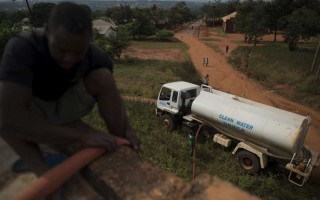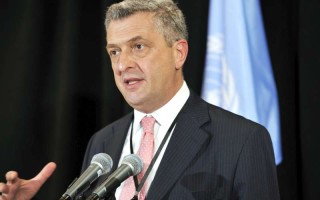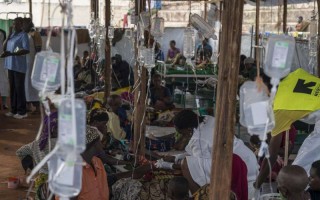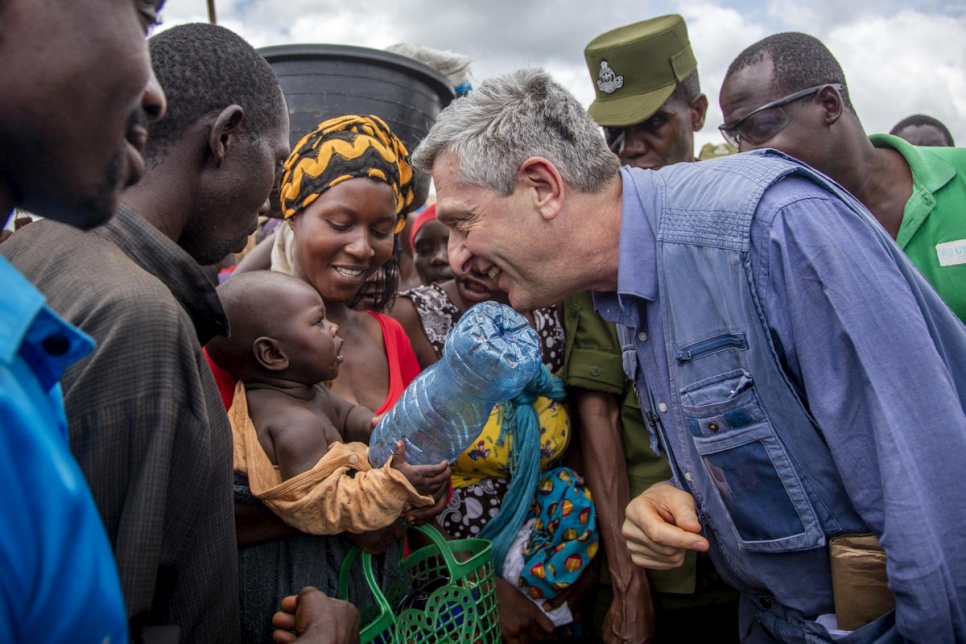
UN High Commissioner for Refugees Filippo Grandi meets with refugees at Nyarugusu Refugee Camp, Tanzania. © UNHCR/Georgina Goodwin
Concluding a four-day visit to East African nation, Filippo Grandi urges greater investment for north-west regions hosting 330,000 refugees.
By Melissa Fleming
Dar es Salaam, 8 February 2019 – The UN High Commissioner for Refugees, Filippo Grandi ended his four-day visit to Tanzania with a call for greater investment in north-west regions where some 330,000 refugees are hosted, including for priorities such as environmental protection and economic development. Citing Tanzania as “one of the most important refugee asylum countries in Africa,” Mr. Grandi expressed his satisfaction with government assurances that the country would continue to be hospitable to refugees.
In his meeting with President John Joseph Magufuli, Mr. Grandi commended Tanzania for its long tradition of welcoming refugees fleeing conflict and persecution in neighboring countries, including naturalizing 162,000 Burundian refugees from 1972. Citing Tanzania’s hospitality over decades to people in need of refuge, he said that the country and the people deserve greater international recognition. He pledged to mobilize more support for humanitarian efforts and also for host community development, enhanced camp security and environmental projects, such as energy sources that provide an alternative to firewood. They discussed the idea of establishing a regional framework to work on improving lives and finding solutions for the Burundian and Congolese refugees.
“It is important that nobody is forced back.”
In his meetings with government officials, Mr. Grandi noted that sustainable refugee return happens when refugees feel confident it is safe to go back home and receive the necessary support to do so. In the last two years, 57,865 refugees from Burundi have been assisted to voluntarily return from Tanzania. However, some refugees report that perceived pressure from government officials coupled with restrictions on freedom of movement and access to livelihood opportunities has influenced their decision to return. Mr. Grandi noted in his meetings that UNHCR is prepared to work with the government to assist all those who indicate a desire to go home but that, in his experience, some restrictions can be counterproductive and that it is when refugees are convinced that conditions are safe in their home countries that they will choose to return voluntarily.
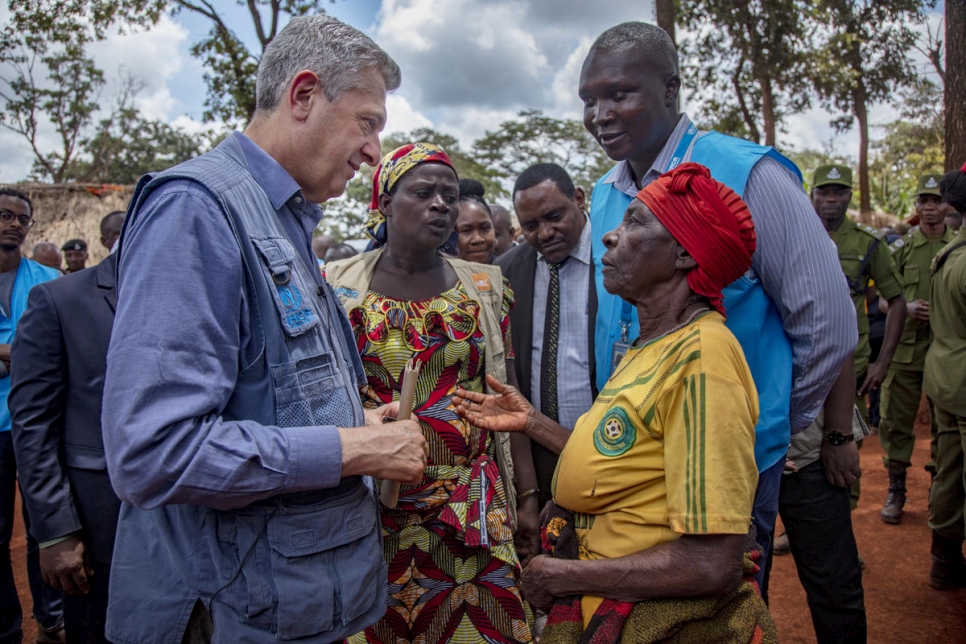
Filippo Grandi talks with 86-year-old Congolese refugee Apolina about her new shelter. © UNHCR/Georgina Goodwin
“Conditions are still uncertain in both DRC and Burundi,” Mr. Grandi said to the press following his visit to the Nyarugusu Refugee Camp in Kasulu, noting that nevertheless some refugees are volunteering to go back and are supported by UNHCR. “It is important that nobody is forced back, that repatriation remains a voluntary exercise.” Mr. Grandi called for more international support to ensure refugees who return voluntarily are able to successfully reintegrate in their countries of origin, noting the current return packages and the ability to follow up with returnees back in Burundi are insufficient.
Mr. Grandi pointed to Tanzania as a stable country in a troubled region and commended the country for its role as a regional peacemaker, urging the Tanzanian leadership to continue peace efforts. In a meeting in Dar es Salaam with the former President of Tanzania, Benjamin William Mkapa, who recently served as EAC Facilitator of the Inter-Burundian Dialogue Process, Mr. Grandi expressed his hope that mediation efforts would continue. Mr. Mkapa cited concerns that the process had stalled and, although progress was made in the area of security, a political impasse remains and dialogue between the stakeholders is the only way out of the current crisis and toward free, fair and inclusive elections planned for 2020.
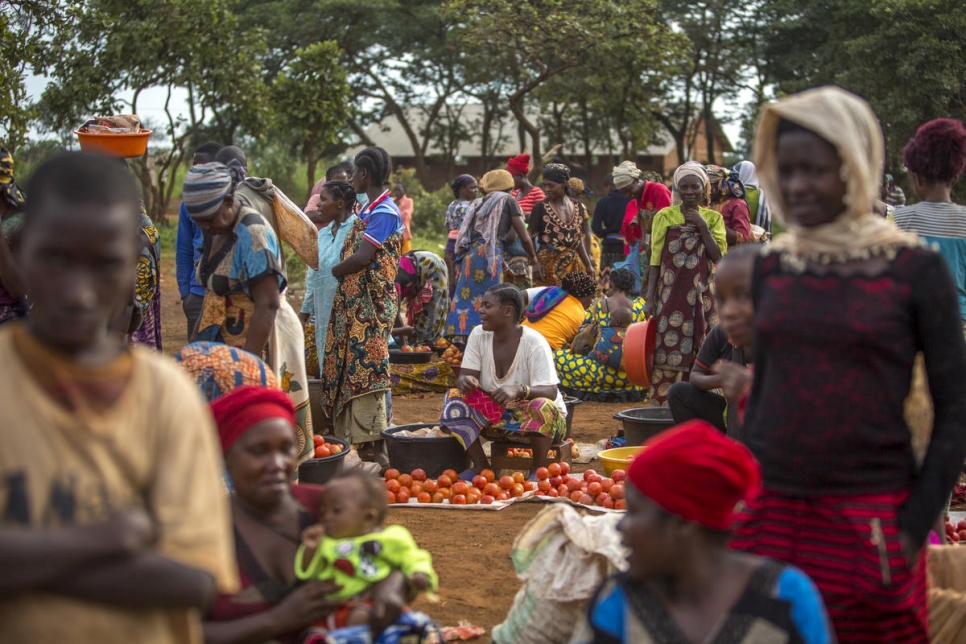
The market at Nyarugusu Refugee Camp enables refugees to access a variety of foods. © UNHCR/Georgina Goodwin
Seventy-four per cent of Tanzania’s refugees and asylum seekers are from Burundi, and the other 26 per cent are from the DRC. The vast majority live in camps close to the border areas, and many have been there for decades.
Mr. Grandi praised Tanzania for supporting the Global Compact on Refugees, an approach which calls for greater international support to host countries. It also calls for more refugee self-reliance, which stimulates local economies and provides opportunities for host communities, he said. During his visit to the Nyarugusu Refugee Camp, Congolese refugee Selemani Boaz, a trader at the market, remarked: “The common market helps us interact with different people, even from outside the camp, especially Tanzanians… We get to know each other and this helps unite us.” The market also allows refugees to access a variety of foods, beyond their World Food Programme rations.
Originally published by UNHCR on 8, February 2019



